Most coverage of today’s GCSE results looks at changes in entry and attainment compared to last year. But it is worth looking at how things have changed in the longer run.
The last few years have seen a series of major changes to qualifications and to secondary school accountability. Both have affected the number of 16-year-olds entering different GCSE subjects.
The rise of the EBacc
The graphic below shows how entries in EBacc subjects have increased since 2012 – notable exceptions being French and German. It’s worth bearing in mind that the population of 16-year-olds fell every year from 2013 to 2018, with a small increase only coming in 2019.
For all the rhetoric around it, the EBacc has had little effect on take-up of modern foreign languages. Geography, history and computing – a new subject introduced in 2014 – have been the main beneficiaries of the EBacc.
Getting scientific
FFT Aspire
Schools that subscribe to FFT Aspire can use the free Key Stage 4 Early Results Service, which provides an early analysis of their results. Click here for more information.
Not an FFT Aspire user?
Some of the increase in GCSE entry was due to students switching to GCSEs from non-GCSE alternatives, for instance switching from BTEC science to GCSE core and additional science.[1] This was particularly the case in 2016, the first year Progress 8 was calculated.
Entries in regulated international GCSEs in biology, chemistry and physics also stopped being eligible for school performance tables after 2017, and this contributed to some of the increase in entries in GCSEs in those subjects in 2018.
There was a dip in core and additional science in 2017 – shown in the chart above under the heading science – due to schools not entering Year 10 students in core science a year early because, with the discontinuation of the two qualifications, results would not be eligible for school performance tables when students reached the end of Key Stage 4 in 2018. Entries duly increased in 2018 and did so again this year.
The broader picture
Other subjects have fared less well, as the graphic below – covering selected non-EBacc subjects – shows.
Design and technology has been in long-term decline ever since it stopped being a compulsory subject at Key Stage 4 at the start of the century. The fall in 2018 appears even more pronounced, but this is due to food technology being replaced by a new GCSE in food preparation and nutrition, which is reported separately in GCSE results data. The prevailing funding situation in schools probably doesn’t help take-up too.
Other subjects appear to have initially increased in entries since 2012 and then fallen away.
Most of the increase between 2012 and 2015 is due to schools switching from qualifications that became ineligible for performance tables following the Wolf review. The classic example is religious studies, which we wrote about here. Initially we see an increase in students taking the full course GCSE, but this was entirely driven by switching from the hitherto popular short course. Numbers fell after 2016 but largely stabilised in 2019 – albeit a year in which the cohort size increased.
The same applies to most arts subjects (drama, music, performing and expressive arts). The increases between 2012 and 2015 are the result of schools switching back to GCSE from alternative qualifications, as we wrote here. Entries have been increasing in art and design, though, and have now returned to 2015 levels. There are fewer technical awards, which are an alternative to GCSEs, in art and design subjects this year than there were last year, which may explain the increase in part.
It’s also worth bearing in mind that the GCSE results data published today does not include other types of qualification. There are popular BTEC courses in sport, business, performing arts and music which still count in performance tables. We are aware, for instance, that some of the recent decline in GCSE PE is due to schools switching to BTEC sport. Schools which previously offered the now discontinued GCSE ICT may have switched to technical awards instead.
To explore trends in GCSE entries and attainment in every subject, visit our results microsite.
And sign up to our mailing list to make sure you receive all of our analysis in future.
1. Core and additional science have now been replaced by double award science.



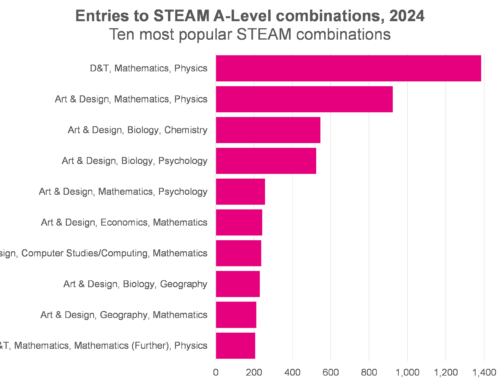
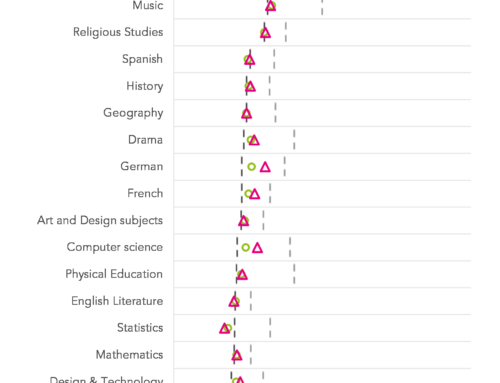
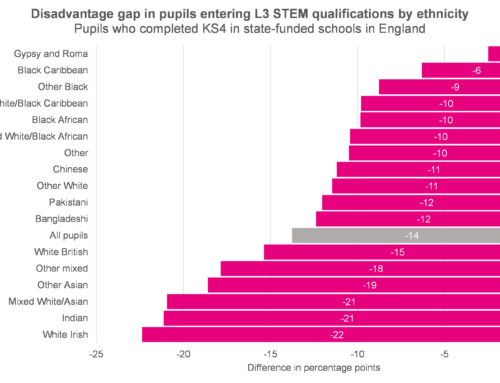
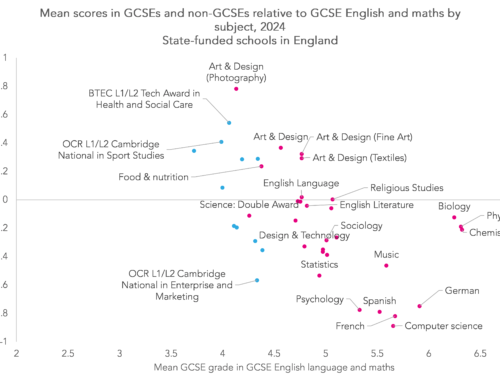
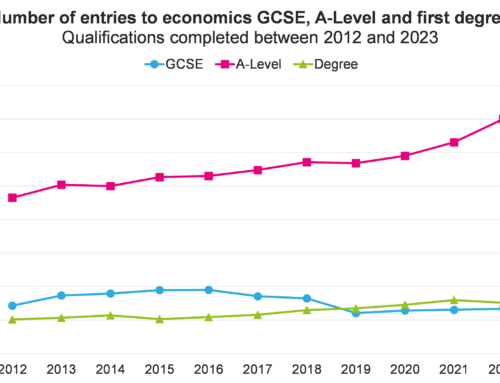
If a school has a low entry to ebac is this a bad thing? 17.5% is the figure. But yet the school has the best progress 8 score in the authority? So are they achieving this by not entering the children for the ebac and entering children for easier btec exams instead?
Thank you.
Hi Ali. I’m sure you’d find many who would argue that a low Ebacc entry rate is a bad thing and at least as many who say it isn’t! In Progress 8 there are slots for English, maths, the EBacc subjects (science, humanities, MFL) and then “anything else”. The crucial thing is that you don’t have to enter all the EBacc subjects to fill the 3 EBacc slots in Progress 8. If you do science and a humanity (geog or hist) you can fill the slots without having to take MFL. I would imagine at this school everyone (or almost everyone) is taking science and humanities but not many are taking MFL.
So how has the school achieved the best progress 8 in the authority but has a lower ebac entry than the 2 other schools it was previously below. I ask as a parent as don’t want my son – who is academic – going to a school where only 17.5% of children are entered for ebac but yet progress 8 score is better. I just wonder how they have suddenly jumped to the top of the progress 8 table in my authority. The other schools have ebac entries of 40 and 50%. Surely that is better, even though they are slightly below for progress 8.